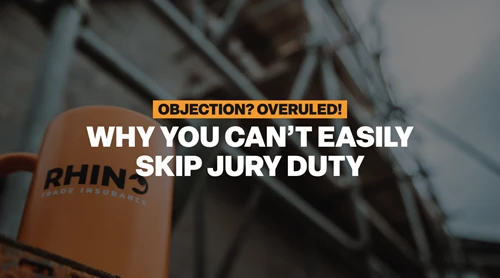Business accounting can be a headache. It can be difficult to keep on top of your records when you’re busy doing your day job, and frankly, you’ve got better things to do than faff around with an Excel spreadsheet.
If this sounds like you, it’s time to re-think your approach to financial management for tradespeople. Instead of a grim burden, your records are an asset which can help you get paid on time, settle taxman disputes and better plan for business growth. Let’s take a look at how good record-keeping can be a powerful asset in your plans for trade world domination!
The Fundamentals of Record Keeping for Tradespeople
If you’re a salaried employee, then you can stop reading right now. Move along, there’s nothing to see here. If, instead, you’re one of the over 1 millon people who are self-employed in construction and other trades, then this blog is for you.
Tradesman record keeping is the silent cornerstone of any successful trades business. It’s not often talked about, but any tradesperson worth their salt runs a tight ship when it comes to their books. From tax compliance to an accurate understanding of your financial position, the benefits of keeping your books well are clear.
But what exactly does ‘record keeping’ cover? Let’s go over some fundamentals.
Whether you’re working as a self-employed plumber, carpenter, builder, joiner, gas engineer, gardener, chimney sweep, cake decorator or electrician, you need to come up with a system to keep your records organised and accessible. Records include any electronic or paper documentation of your business operations, for example receipts, contracts and correspondence. While your grandad might have relied on an over-stuffed shoebox and hand-written ledger book, you can take advantage of technological developments. It’s an excellent idea to use electronic software for your business filing needs, such as Xero or QuickBooks. This new-generation accounting software doesn’t replace a good accountant, but it makes bookkeeping a breeze by automating many of the traditionally time-consuming functions.
Remember, you need to stay on the right side of GDPR at all times, which means secure storage and retention (whether physical or electronic) of sensitive customer data (including anything containing addresses and contact information).
If you’re already a sole trader or limited company director, then you’ll be familiar with the annual Self-Assessment submission. This is how HMRC learns about what you’ve spent and earned over the previous tax year, and it uses this information to calculate the income tax you owe, as well as tracks your National Insurance contributions, VAT plus income from extras like land or property. Keeping accurate records of your business finances will make filling in your Self-Assessment a bit of a doddle. Not only this, it will help keep the taxman off your back by helping you demonstrate that you’re paying the correct amount of tax in the event of an inquiry. Unfortunately, self-employed contractors and sub-contractors can find themselves the subject of one of these enquiries at any given moment, so it’s crucial you have your records to hand.
If you’re running a limited company, you’ll also be used to submitting (or working with an accountant on) annual accounts, including a balance sheet and profit and loss account.
Electronic accounting software can be a big help when it comes to keeping your tax affairs straight. It can even give you real-time estimations of your tax bill at any given moment, helping you see the big picture of your business’s tax liabilities.
You should keep a meticulous record of every single thing you spend money on for business purposes. This includes fixed costs such as business rent and business loan repayments, marketing costs, essentials such as materials, uniforms and PPE, capital investments like vans, and the daily running costs of a business e.g., petrol and even the odd lunch thrown in (so long as it’s strictly to discuss business)!
Again, if you’re using an electronic bookkeeping software system, anything you tag as an expense is automatically captured and reconciled.
It’s no good keeping a record of your expenses unless you keep the receipts, too. If you’ve made the purchase digitally, you’ll have an email receipt which you should keep in a dedicated folder to make sure everything is to hand when tax time comes around. Using an online accounting software makes this incredibly simple. Even if you do still deal partly in paper, then you can simply take a photo of the item (receipt, invoice etc) and upload it onto the software, which will electronically capture the details and upload to the system thus saving you loads of manual input time.
Electronic or paper, it doesn’t matter in this day and age, but you need to have proof of all your business spending. Otherwise, you won’t be able to claim it as a business expense.
In any trades business, cash is flowing in and out all the time. It can be difficult to keep track of whether your business is actually making profit unless you track cash flow. The cost of parts and materials, petrol, snacks and energy drinks (so many energy drinks) must all be weighed up against the money actually coming in. So, if you’re a plumber, you might earn £1,000 one day, but when you’ve factored in the cost of new taps, valves, a dab of silicone and a new thermostat, you might have only made £200. This won’t be reflected in your day-to-day records, as you will have probably bought the materials either on account or at an earlier time. So, obviously, the money for these materials will have left your account on a different date. This might seem basic but many tradespeople fall down on this issue, so don’t let cash flow woes hamstring your business growth.
Without meaning to sound like a broken record, but a digital accounting software will help you track your cash flow with detailed information generated via instant reports. If you’d rather be old school, Microsoft Excel is still an invaluable tool for those who have the right skills.
Your record-keeping should also include the time you spend in the name of business. So, the length of time it takes to change a straightforward tap. The time you spend in traffic every day. The time you spend on visits and talks with suppliers or contractors. Record it all!
This will only be a record for you, so there’s no onus to get things exactly right. But it’s a good idea to keep as accurate records as you can for your own benefit, so you can conduct an analysis of what’s acting as a time vampire and sucking you dry.
Once you’ve started keeping a solid record of all of the above, you’re in a position to conduct a margin analysis to discover where you’re making the most money with the least effort. This will really unlock important information about your business profits which can be the key to streamlining your offering and boosting your business profitability.
Any good online accounting software will be able to offer you insight into your business performance in just a few clicks via their profit and loss reports, expenditure analysis and customised reports which use historical data to inform future quotes and project planning.
Navigating Disputes with Solid Documentation
As we mentioned, keeping accurate records will come in handy in the case of any disputes. In most trades, disputes are par for the course, with issues around payment, question marks over tax and customer claims against your business coming your way no matter how conscientiously you operate.
In situations like these, having access to detailed and up-to-date records will be the ace up your sleeve. You will be able to immediately produce records as evidence in order to quickly resolve HMRC queries, client disputes or claims.
Long-term Benefits of Meticulous Record Keeping for Tradespeople
Your bread and butter will always be your trade. You don’t have to suddenly become a finance wizard, an app geek or a data nerd. But if you invest a little extra time and effort into your record keeping, you’ll be able to maximise your business efficiency. Better organisation means better visibility of where your business is at any given moment, which will help you plan for the future. For example, things like capital purchases and hiring new staff are all best done after taking a look at your finances. Digital accounting software can help you with forecasting for the future, and don’t forget the value of having a good old accountant at the other end of the phone.
Keeping clear and accurate records are crucial to the success of any self-employed tradesman or woman. Ultimately, whatever trade you’re in, you’ll reap the benefits of diligent record keeping, from financial stability to enhanced reputation and growth opportunities. By making sure you keep accurate documentation of all work, contracts, and client interactions, you’ll not only safeguard yourself against disputes, but also aid in financial management, preparation for tax time, and overall operational efficiency.




